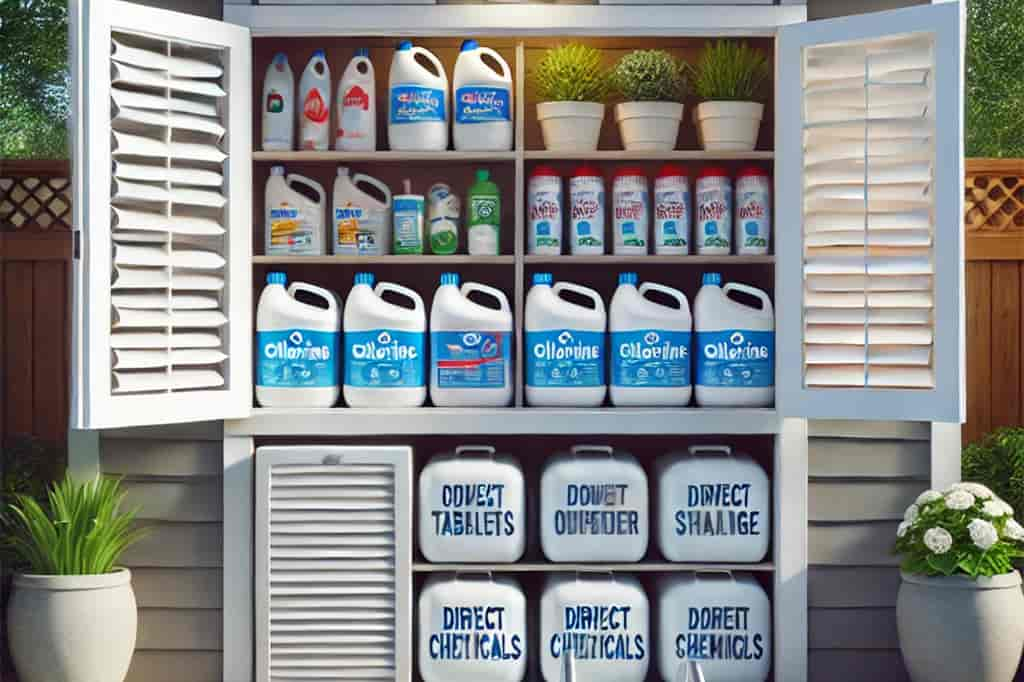Chlorine tablets are a popular and effective way to maintain clean and safe pool water, but proper storage of these chemicals is crucial for both safety and effectiveness. Whether you’re new to pool ownership or a seasoned pro, understanding how and where to store chlorine tablets can make a big difference in the longevity of the product and the safety of your household. In this blog, we’ll explore the best practices for storing chlorine tablets, ensuring you get the most out of your investment while keeping your environment secure.

The Importance of Proper Storage
Chlorine tablets are essential for keeping your pool water free from harmful bacteria and algae. However, improper storage can reduce their effectiveness or even create hazardous conditions. When stored correctly, chlorine tablets can last for several years, maintaining their potency and providing you with consistent water sanitation. On the other hand, poor storage conditions can lead to premature degradation, wasted money, and potential safety risks.
Ideal Storage Conditions for Chlorine Tablets
To maximize the lifespan and safety of your chlorine tablets, consider the following storage guidelines:
1. Cool, Dry Place
Chlorine tablets should always be stored in a cool, dry place. Moisture and heat are the biggest enemies of chlorine tablets, as they can cause the tablets to break down prematurely or even trigger a chemical reaction. A temperature-controlled environment is ideal—aim for a location that stays between 50°F and 70°F (10°C to 21°C). Avoid storing chlorine tablets in areas that experience extreme temperature fluctuations, such as garages or sheds without climate control.
2. Keep Them Sealed
Always store chlorine tablets in their original container with the lid tightly sealed. This prevents moisture from the air from getting into the container and reacting with the tablets. The original packaging is designed to protect the tablets from environmental factors, so it’s best not to transfer them to another container unless absolutely necessary. If you do need to use another container, make sure it’s airtight and made of a material compatible with chlorine, such as high-density polyethylene (HDPE).
3. Avoid Direct Sunlight
Exposure to direct sunlight can cause chlorine tablets to degrade more quickly. The UV rays from the sun can break down the chemicals in the tablets, reducing their effectiveness and lifespan. Store your chlorine tablets in a shaded area, away from windows or any place where sunlight could directly hit the container.
4. Keep Away from Other Chemicals
Chlorine tablets are reactive and should not be stored near other chemicals, particularly those that are flammable or oxidizing agents. Mixing chlorine tablets with incompatible substances, even accidentally, can lead to dangerous chemical reactions. Store your chlorine tablets separately from other pool chemicals, such as algaecides, pH adjusters, and especially any acids.
5. Out of Reach of Children and Pets
Safety is paramount when storing chlorine tablets. These chemicals are toxic if ingested and can cause severe burns if they come into contact with skin. Always store chlorine tablets out of reach of children and pets, ideally in a locked cabinet or a high shelf. Ensure that the storage area is well-ventilated to avoid the buildup of chlorine fumes, which can be harmful if inhaled.
Common Storage Locations: Pros and Cons
Here are some common storage locations for chlorine tablets and what to consider for each:
1. Garage
Pros: Garages are a popular choice because they are often close to the pool and provide a sheltered space.
Cons: Garages can get very hot in the summer, leading to temperature fluctuations that can degrade the tablets. If your garage is not climate-controlled, it may not be the best place to store chlorine tablets.
2. Pool Shed
Pros: Pool sheds are convenient for storing all your pool-related supplies in one place, including chlorine tabs for pool maintenance.
Cons: Like garages, pool sheds can get very hot and humid, especially in warmer climates. Without proper ventilation and climate control, a pool shed might not offer the ideal storage conditions.
3. Basement
Pros: Basements are usually cool and dry, making them an excellent location for storing chlorine tablets. They also tend to have stable temperatures year-round.
Cons: Basements can sometimes be damp, which could introduce moisture into the storage environment. Ensure your basement is well-ventilated and free from leaks if you choose this location.
4. Utility Room
Pros: Utility rooms inside the house are often temperature-controlled and dry, providing stable storage conditions for chlorine tablets.
Cons: These rooms are usually inside the home, so extra caution is needed to ensure that children and pets cannot access the chemicals.
Conclusion
Storing chlorine tablets correctly is vital for both their effectiveness and your safety. By following the guidelines outlined in this blog, you can ensure that your chlorine tablets remain potent and safe to use throughout their lifespan. Always remember to store them in a cool, dry place, away from direct sunlight, other chemicals, and out of reach of children and pets.
Whether you’re using chlorine tabs for pool maintenance or another purpose, proper storage practices will help you get the most out of your investment and maintain a safe environment. By taking the time to store your chlorine tablets correctly, you’re not only protecting your pool but also the safety of everyone who enjoys it.




